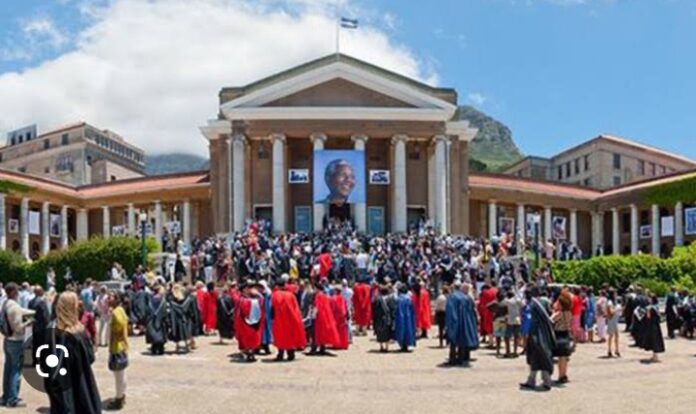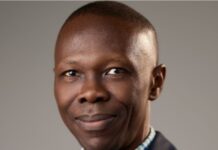Confusion reigned on Friday over the suspension of Professor Mamokgethi Phakeng, vice-chancellor of the University of Cape Town (UCT) in South Africa. In a new twist to a long leadership controversy, it was reported that the council offered to drop all claims against her if Phakeng agreed to early retirement – but she refused.
Asked by University World News late on Friday whether the vice-chancellor had been suspended, the chair of the council, Babalwa Ngonyama, said: “No that’s not correct. She is not suspended.” Most major media outlets reported that Phakeng had been suspended or was about to be.
UCT was also buffeted last week by student protests over fees and accommodation problems, prompting the university to shut down and move classes online. Law Dean Professor Danwood Chirwa said students had disrupted lectures, been rude and aggressive towards staff and other students, and had even assaulted some, News24 reported.
Agreement Refused
An agreement over early retirement would halt an investigation into governance concerns that rocked the University of Cape Town – one of Africa’s top universities – during much of 2022. But Phakeng has said she wants the investigation to proceed, to clear her name.
The university budgeted ZAR9 million (about US$500,000) for the probe. But apparently unknown to the four-member investigation panel led by retired Supreme Court of Appeal president Lex Mpati, the council made overtures in a letter to Phakeng, offering her a retirement package in 2024.
An offer letter, sent via Halton Cheadle from the Cape Town law firm Bradley Conradie Halton Cheadle on 10 February, and seen by University World News, said the council had agreed the day before (9 February) on the disbandment of the investigation and withdrawal of all allegations against Phakeng.
But amid ongoing discussions, Phakeng, through her lawyer, told the university that the offer that she retires should not be dependent on halting the probe.
Also, the lawyers say: “Our client asserts that she remains willing to subject herself before the panel as she is yet to be provided with an opportunity to ventilate her case.”
Phakeng told University World News: “The letter of offer from UCT is clear that this council wants the panel to be disbanded, and my question is why, when they have made so much noise about it, messing up my name? I have nothing to hide.”
Phakeng’s refusal to accept the offer – and, allegedly, the council’s lack of faith in the panel to get rid of the vice-chancellor – reportedly prompted the council to threaten suspension. On Friday 17 February, the university and the Council Chair Babalwa Ngonyama said that Phakeng had not been suspended, despite rumours.
Also on 17 February, Minister of Higher Education, Science and Innovation, Dr. Blade Nzimande said via his spokesperson, Ishmael Mnisi, that he hoped the UCT council was approaching the matter of the vice-chancellor with requisite care and was mindful of labour law as required by the Higher Education Act.
The minister will be writing to the council to request a report and an update on the matter.
Deep Divisions On Campus
The Black Academic Caucus has criticised the council’s apparent eagerness to drop the probe and said in a statement that it was “shocked and disturbed” that the council had decided to take the route of forcing the vice-chancellor into early retirement.
“The university experienced great turmoil and suffered reputational damage over the last year due to the issues that were supposed to be investigated by the recently appointed independent panel led by Judge Mpati,” the caucus said.
“If this process is aborted, then the university will be left none the wiser about the real causes of the issues that played out in public last year, and we will be unable to review and strengthen our processes and policies so that we don’t find ourselves in a similar predicament in the future.”
The four members of the panel are Mpati as the chair, Judge Azhar Cachalia, Dr. Bernadette Johnson and Dr. Trish Hanekom.
Three council members interviewed by University World News – who did not want to be named – said they were not informed of the council decision, which they said was taken in secret, suggesting that the council had been ‘captured’ and was doing what it wanted without consultation.
One of them was angered by the proposal to pay off Phakeng, and said: “The judges and the panel must feel that this is a bona fide case and that they would be assisting the university, but what is happening camouflages the real intentions of the council.”
Ironically, the council has proposed a mutually agreed statement on the reasons for Phakeng taking early retirement that ensured her reputation would remain intact.
In the offer letter, the council said it wanted an undertaking that neither Phakeng nor the university would issue disparaging statements about each other in the future.
The council letter said one condition for an agreement was the disbandment of the investigation and “withdrawal of all allegations giving rise to the issues before the panel for investigation, namely those relating to her misleading the senate, her executive relationships and the reasons for the resignations of her executive and the use of non-disclosure agreements”.
Other conditions included a mutually agreed statement on the reasons for Phakeng taking early retirement “that ensures her reputation”, and: “An undertaking that neither Professor Phakeng nor the university will issue disparaging statements in respect of each other in the future.”
Both Phakeng and Council Chair Ngonyama were accused last year of misleading the university’s executive and senate about the reasons for the departure of the deputy vice-chancellor for teaching and learning, Associate Professor Lis Lange.
They allegedly claimed that Lange had resigned, in March 2022, for personal reasons. But three months after she left, Lange said in a letter to the senate that she had been forced out. There have been several other departures of long-standing senior executives, many of whom were reportedly obliged to sign non-disclosure agreements.
Ngonyama, the council chair, had also been the focus of investigation but was charged by council members to give Phakeng a ‘sweetheart’ deal.
There are also divisions among academics, with many seeing Phakeng as confrontational. One of them is Professor Jeremy Seekings, professor of political studies and sociology, who told the Cape Town Press Club last Monday that it was “extremely unlikely” that she would be able to continue because her credibility and legitimacy had been eroded.
Seekings, whose wife, Professor Nicoli Nattrass had a very public clash with Phakeng over alleged racism in an article she had written, is one of the few academics who speak out under his name. Business Live reported on Friday that he said the majority of the council was against the vice-chancellor.
In his Press Club talk, “Seekings highlighted the dysfunctionality of management under Phakeng, who, he said, did not have a good working relationship with most of her executive team. This had resulted in several resignations and axings,” according to Business Live.
Seekings said tensions between the senate, the council and the executive had risen over the past year, contributing to low morale among academics. “In terms of everyday experiences, there is a real crisis.”
University World News














